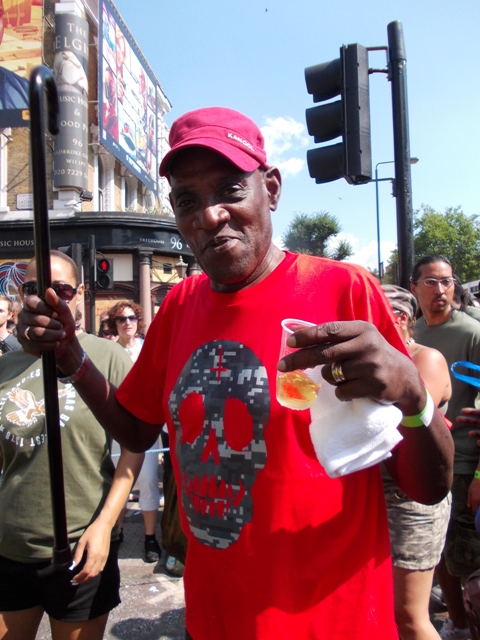By Debbie Ransome
Going beyond the basic storyline to dig deeper into the Haitian reality and how it gets reported, this

It’s been a couple of years now since I last saw Darcus Howe, whose career of campaigning for black rights in the UK has come to an end with his death at the age of 74. At the time, he was in the mood for celebrating and I bought him a Carib beer.
It happened at a typically Trinidadian event: calypso giants the Mighty Sparrow and David Rudder were due to perform in north London. Some people decided that British-style waiting to get in was not for them and they “stormed” the queue, Trini-style.
We could have been outside Queen’s Park Oval for some cricket event or in the Queen’s Park Savannah for a Carnival gig, but no, this was a piece of Trinidad taking place in London.
Darcus was a little frail when I handed him the bottle. He smiled, we laughed about past memories and it reminded me of how even the mightiest of warriors can get old and weary. During the course of the evening, many people came up to him to shake his hand and wish him the best. He remained the toast of the evening, even with the presence of Rudder and Sparrow on stage.
He had been diagnosed with prostate cancer in 2007. However, he continued to write his columns, write about his cancer, keep up his campaigning and even join in the festivities at Notting Hill Carnival (as you can see from the photo I took in 2013).
Reaping the whirlwind
Darcus showed his true lion colours when he turned up for a Trinidadian screening of his controversial 1987 TV documentary The Gathering Storm, which had already been seen in the UK.
The programme showcased the growing problems for then oil-rich Trinidad in terms of crime and race issues.
With hindsight, his predictions were amazingly accurate. But many Trinidadians were baying for Darcus’s blood after the film’s initial broadcast, as they did not like the idea of their dirty washing being aired on foreign television.
Any other broadcaster might have avoided a showdown. However, when I and my colleagues in the then recently-formed Media Association of Trinidad and Tobago (MATT) later held a public screening of the programme in Trinidad, we invited Darcus and he answered questions from the floor, taking on his critics.
It was a lively affair; you’d expect no less from Darcus.
Darcus wrote about the film again in the New Statesman after Trinidad reaped the whirlwind of that predicted storm: the attempted Jamaat-al-Muslimeen coup of 1990. In a six-day hostage crisis, the Prime Minister, MPs and others attending a Friday afternoon sitting of parliament were held hostage by the Muslimeen, who eventually dodged a treason sentence thanks to a Privy Council judgement.
The coup attempt provided Trinidad with an early taste of radical Islamist teaching and its power to lure disenfranchised young men living in a multicultural society, years before 9/11, 7/7 and the latest acts of terrorism that have become daily news fodder in Western society today.
CLR, Race and activism
Darcus originally came to London in 1961 to study law, but moved into civil activism, working for his uncle and mentor Trinidad-born historian C.L.R. James on the publication Race Today, where Darcus served as editor from 1975 to 1985.
Throughout his whole life, he continued to speak truth to power, both in the UK and back home in Trinidad.
He contributed to a number of publications, from the New Statesman to The Voice newspaper, and hosted the gladiator-style programme The Devil’s Advocate on British TV.
For many in British society outside the Caribbean Diaspora, he became known for his arrest as one of the so-called Mangrove Nine, who were charged for protesting against repeated police raids on the Caribbean restaurant Mangrove in Notting Hill in 1970, as well as organising the Black People’s March in 1981 in protest over police handling of the investigations into the New Cross fire in which 13 black teenagers died.
He will be remembered as a broadcaster and activist who, as Lord Bill Morris put it, “would call it as he saw it”.
He made his mark. I’m so glad I bought him that last beer.
Related articles
Trinidad Newsday obituary
Darcus Howe on 20 years of adventure with Channel 4
By Darcus Howe, from 1999, New Statesman Nigerians want to halt a British TV series: What a cheek!
Trinidad Guardian: BBC apologises to Darcus Howe
By Debbie Ransome
Going beyond the basic storyline to dig deeper into the Haitian reality and how it gets reported, this
[photo: Patti Smith & Winston Rodney, cred Ted Bafaloukos]
In a year of global challenges and fall-out, we at Caribbean Intelligence© have focused on the aspirational side of Caribbean life.